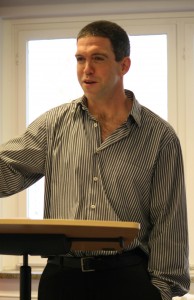
“The title of my lecture is going to be ‘Prisoners like us’, the phrase Socrates uses in Republic Book VII when he describes the allegory of the cave”, David McNeill, guest lecturer at ECLA on November 18 began. McNeill received his BA from St. John’s College, in Annapolis MD, and has a PhD from the University of Chicago’s Committee on Social Thought. For the hour and a half following, the BA and AY students embarked upon a consideration of one of Plato’s most famous and often-quoted passages: the allegory of the cave, asking what it might mean and why it was first developed.
After reviewing Book V, Dr. McNeill proposed that the facts presented in this chapter develop later into the description of Plato’s cave. After drawing a thorough plan of the ideal city, which includes a supposedly necessary undermining of people’s freedom and the implementation of ways of organizing the community of men, women, and children, the question is no longer “can this be possible?”, but rather becomes “how can this be justified?” Given that the city is founded on a set of ‘noble lies’, the justifications previously given cannot be sufficient. It is for this reason, according to Dr. McNeill, that the text introduces the idea of the philosopher-ruler, who has the knowledge and superior understanding necessary successfully to achieve the construction of the ideal city.
Book VII begins with a description of the well-known allegory of the cave. David Dr. McNeill suggested that the cave allegory functions as metaphor for education and for its failure. Evoking the scenario recounted in the allegory he noted: “Our perception of the world is formed by the shadows cast by those objects, objects that were made by somebody who is no longer there”, he explained. He went on to propose that in the context of The Republic, imitation is always presented as having a fallible structure.
“The similarity between imitation and the actual thing is often very distant”, he said. How does the role of the philosopher function in this structure? The allegory tells of a man who was able to free himself of the chains and to leave the cave, for the first time seeing things as they truly are. The question then is: should he come back to the cave and attempt to show his former community the real truth of things? If a parallel is drawn with the city-in-speech, philosophers there – unlike in other communities – are bred within the city; the entire city is responsible for their education, in a true communal spirit.
After the philosopher has escaped the cave, he is supposed to answer to the community from which he came. “But suppose it’s by nature he gets out. In that case, it wasn’t due to the society, or its legislation, that he was enabled to gain knowledge”, Dr. McNeill suggests. He then went on to say that in a certain way, it looks like the philosopher owes the city something, and at the same time, it seems he doesn’t. “This is the kind of dialectical study The Republic gets into”, he stated.
Socratic dialectical reasoning is the process of submitting one’s assumed knowledge to a test through questions and answers, a proper dialogue, in order to see if there is any inconsistency in that knowledge. “The problem with dialectical education is that an ordinary man would have learned to ask questions, and realize the philosopher ruler doesn’t have all the answers. If to this we add the fact that the philosopher must also provide an answer to the noble lies, this would lead into a profound scepticism regarding former assumptions”, David McNeill explained. Then, one could wonder, is it just to demand political engagement from philosophers? Should the philosopher be obliged to return to the cave in order to free his previous companions? Does he have such a responsibility?
In any case, what seems to further complicate the issue is the method of dialectical reasoning. What is most properly dialectical is to take up different ways of understanding the world, to filter and refine them through careful philosophical argument. But why is dialectical reasoning better than learning the truth from poets, for example? It is Socrates who introduces this method, and what lies behind the thinking of contrary perspectives is the risk of a loop, a never ending questioning that leads to a paradoxical aporia. What does Plato’s account of philosophy promise us? “The higher good is the good of thinking itself”, Dr. McNeill states. Ewa Atanassow, ECLA faculty member, added that “by thinking, we are more fully realising our nature, our being. It is a more full realization of what is properly human”.
As with any great philosophical lecture, Dr. McNeill’s presentation left us with new questions and further insight into the complexities of Platonic pedagogy.
by María Cruz (AY ’10, Argentina)
